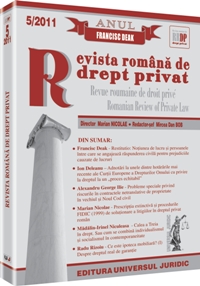Prescripþia extinctiva si procedurile FIDIC (1999) de solutionare a litigiilor în dreptul privat român
The limitation and fidic dispute settlement procedures (1999) under the romanian private law
Author(s): Nicolae MarianSubject(s): Law, Constitution, Jurisprudence
Published by: Universul Juridic
Keywords: limitation; FIDIC procedures; New Civil Code; DAB procedure
Summary/Abstract: One of the most delicate issues, especially in the case of contractor agreements with foreign origin element, having as a model FIDIC contracts but subject to Romanian law, is related to the incidence of limitation for the actions derived from these contracts, given that in compliance with Decree no. 167/1958, the rules on prescription are considered imperative, of public policy, in contradistinction to the New Civil Code system, effective since October 1st, 2011, where the limitation, although of public interest, is governed by mainly non-mandatory, private policy rules. In general, under the system of Decree no. 167/1958, the limitation within the actions derived from the General Conditions of FIDIC Contracts (1999) involves serious problems that may still be overcome through systematic interpretation of the legal provisions and taking into account the specifics and purpose of the mandatory pre-arbitral contractual procedures, which either adjourn or determine the birth of the right of action and, therefore, the beginning of the prescription course – the Engineering notice procedure (Sub-Clause 20.1) and possibly DAB procedure (Disputes Adjudication Board) (Sub-Clause 20.1-20.4) –, either defers the prescription course – the conciliation / settlement procedure prior to referral to the arbitral tribunal (Sub-Clause 20.5) – or, finally, calls off the prescription course of the right to the arbitral (or judicial) proceedings, of course, as far as DAB procedure is, for the above-indicated reasons, a genuine pre-arbitral jurisdiction procedure, so as starting this procedure must be also effective in terms of negative prescription. Hence, without losing sight of the fact that, as for international contracts, where one party is a foreign natural or legal person, the provisions of Decree no. 167/1958, although binding in national law, no longer bear the character of public policy provisions, so that their enforcement should be carried out taking into account both the nature and specifics of the contractual relations with foreign origin element, as well as the contracting parties’ interests, including the indispensability of possible procedures of alternative contractual dispute settlement. Instead, under the system of the New Civil Code, the provisions on prescription mainly have a non-mandatory character. Consequently, the parties may waive these provisions by developing, in many respects, the limitation regime, both in terms of the beginning of prescription, as well as in terms of its suspension or adjournment (Article 2.515). For example, in terms of FIDIC Contracts (1999) it may be established that pre-arbitral contractual procedures have or produce different effects in terms of limitation, namely they may postpone the beginning of prescription – especially for the Engineering notice procedure (Sub-Clause 20.1) – or may suspend the prescription course – for the amicable dispute settlement procedure (Sub-Clause 20.5).
Journal: Revista Română de Drept Privat
- Issue Year: 2011
- Issue No: 05
- Page Range: 97-151
- Page Count: 55
- Language: Romanian
- Content File-PDF

